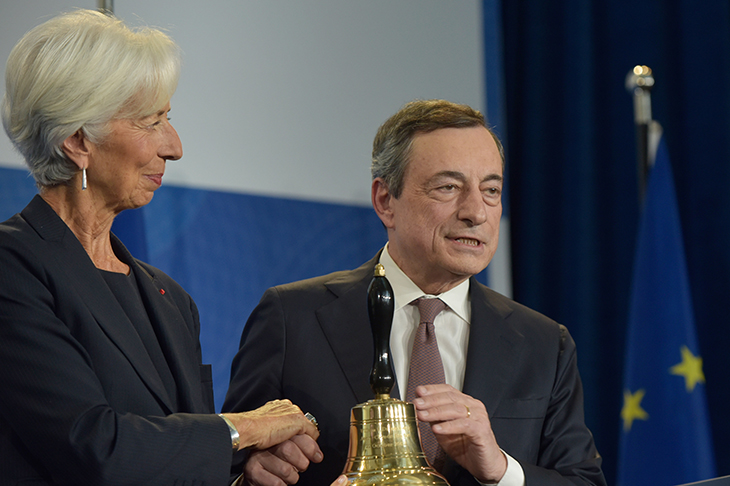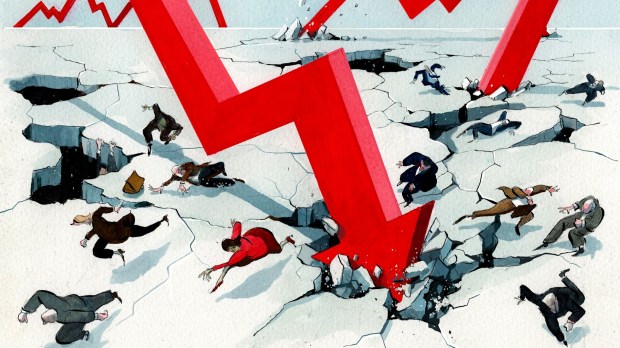Mario Draghi, who retired as president of the European Central Bank this week, was arguably the first holder of that office to win international respect for himself and his institution. The ECB’s founding chief, the downbeat Dutchman Wim Duisenberg, was undermined on all sides but especially by the French — who eventually succeeded in replacing him with their own Jean-Claude Trichet, whom no one remembers for much beyond meddling and posturing and the acquittal from scandal at home that freed him to take up the ECB job in the first place. But former Goldman Sachs executive and Italian central bank governor Draghi wrote himself into history on 26 July 2012, nine months after he took over from Trichet, with his promise to a gathering in London that: ‘Within our mandate, the ECB is ready to do whatever it takes to preserve the euro. And believe me, it will be enough.’
It was indeed enough to calm eurozone turmoil and breathe new life into its bond markets. Since then, Draghi’s deployment of bond-buying programmes and negative interest rates to stave off deflation and recession has found plenty of critics — in Germany, where savers resent zero returns on deposit accounts, and among Eurosceptics who see his policies as desperate props for a failing economic model. But he can hardly be blamed for the refusal of most of Europe to reform and of Germany to inject fiscal stimulus. While EU leaders fudged and dodged, Draghi was a calm, authoritative presence at their shoulder; most importantly, markets took him seriously.
Grande dame
And what of Draghi’s successor, former IMF chief Christine Lagarde? Detractors point out that she’s a lawyer rather than an economist, that her record as France’s finance minister under Sarkozy was tainted by a conviction (without penalty) for ‘negligence with public money’ in l’affaire Tapie, and that her appointment is the result of the usual EU horse-trading: the Germans wanted their Bundesbank’s Jens Weidmann at the ECB but settled for Ursula von der Leyen as Commission president. Among Europe’s new team, however, Lagarde is the one who’s already a grande dame; as the eurozone economy grinds to a halt, she’s also the only one with a toolbox. It will be fun to watch her upstaging the Continent’s inadequate leading men.
Sincerity of purpose
‘Our purpose… Smith & Nephew exists to restore people’s bodies, and their self-belief.’ That statement — by the FTSE100 medical equipment company that traces its history to a Victorian pharmacy in Hull — illustrates the corporate fashion for ‘purpose’, meaning a declared intention to contribute to society in wider ways than merely generating returns for shareholders.
Sceptics see ‘purpose’ as a reinvention of the ‘mission statement’ that flourished until it was suffocated by misuse of hot-button words such as ‘passion’ and ‘heart’. Adherents say the difference is that ‘purpose’ moves a step towards acceptance of the millennial idea that social impact is as important as profit — and thereby a step back towards the ‘stakeholder’ theory advanced by Will Hutton in the mid-1990s but subsequently buried. One key text is a statement of ‘the purpose of a corporation’ issued by the Business Roundtable organisation of 181 US chief executives. ‘While each of our individual companies serves its own corporate purpose, we share a fundamental commitment to all of our stakeholders,’ it begins, going on to talk about serving customers, employees, suppliers and communities on apparently equal terms with ‘generating long-term value for share-holders’. If they really mean it, a corporate revolution is afoot and I’ll soon be writing a lot more about ‘purpose’.
But my question will always be: is this sincerely driven from the chief executive’s desk, or is it a PR screen? Which brings us back to Smith & Nephew. Yes, a maker of hip joints and other orthopaedic products can claim it ‘exists to restore people’s bodies’. But that extra phrase, ‘and their self-belief’, was rendered comical last month by chief executive Namal Nawana — who resigned because his annual pay package, at up to £5 million, is less than half what he says he could earn at an equivalent US company.
Nawana’s own self-belief had clearly been bolstered by his 18 months in post. Smith’s board, faced with the threat of losing a new broom who was boosting the share price, even contemplated re-listing on a US stock exchange in order to circumvent UK shareholders who objected to paying him more. So at the same time as he was filling the annual report with verbiage about ‘Our culture pillars of care, collaboration and courage’ and urging his workforce towards a loftier view of their collective enterprise, Nawana was trying to hold the company to ransom for his own reward. I suppose we could call that dual purpose.
The doormat Chancellor
‘The Budget’s on track for 6 November,’ Chancellor Sajid Javid confirmed in an interview with Robert Peston on 23 October. ‘The only situation in which there won’t be a Budget is if we have a no-deal outcome.’ But within 24 hours, the Budget had been cancelled — knocked aside by the Prime Minister’s insistence on a general election and leaving Javid (according to one ‘senior Westminster figure’ quoted by the Guardian) looking like ‘a doormat’. So we may never hear about the ‘200 policies’ civil servants were said to be testing in early October for a pre-election giveaway, involving a mountain of debt-funded spending pledges as well as raised income tax thresholds and radical reform of inheritance tax. Instead, if the Tories are back in power, we’ll probably get a more restrained package in January, accompanied by the grim economic forecasts Downing Street didn’t want us to hear next week. And I’ll bet they won’t be delivered by the hapless Javid.
Got something to add? Join the discussion and comment below.
Get 10 issues for just $10
Subscribe to The Spectator Australia today for the next 10 magazine issues, plus full online access, for just $10.
You might disagree with half of it, but you’ll enjoy reading all of it. Try your first month for free, then just $2 a week for the remainder of your first year.















Comments
Don't miss out
Join the conversation with other Spectator Australia readers. Subscribe to leave a comment.
SUBSCRIBEAlready a subscriber? Log in